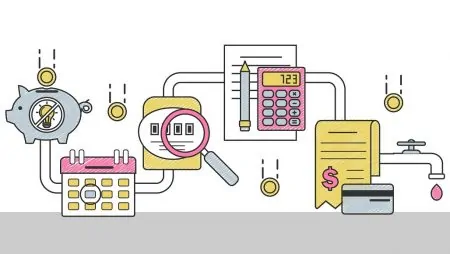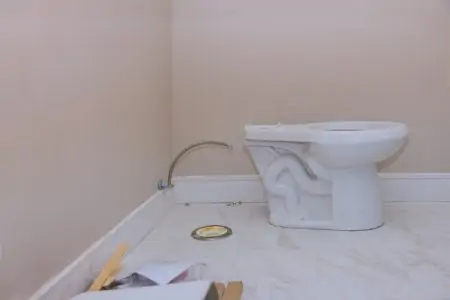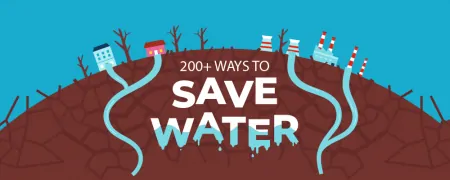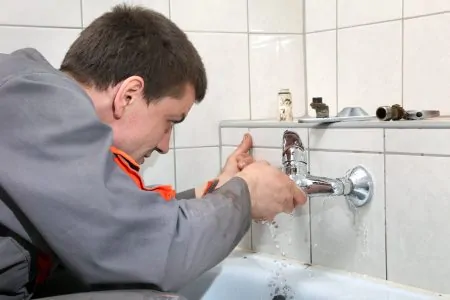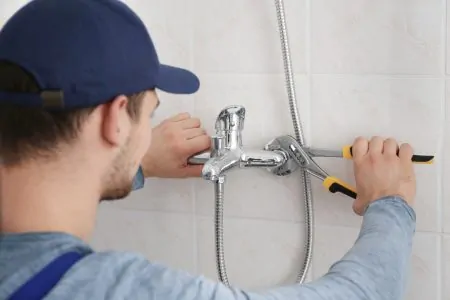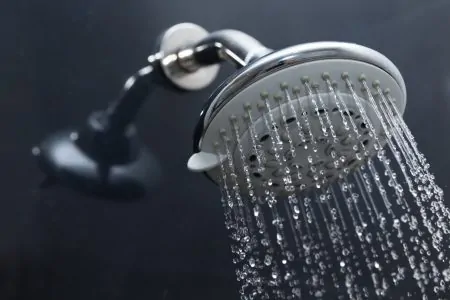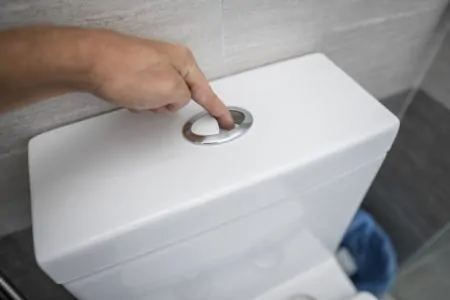You can’t live without water — you need it to survive. But you know what you can survive without? High water bills.
If you’re not being smart about your water usage, you’ll have to watch some of your money go straight down the drain unnecessarily. You’ll be working hours at your job each month to pay for water usage that you don’t need.
Instead of trading hours of our lives, we can educate ourselves and become savvy about our water usage.
The Average U.S. Water Bill Cost

The typical American uses a lot of water — in the range of 80 to 100 gallons every single day.
If you have a family of four living under your roof, your family could be using 400 gallons every day if they’re about average.
$840 A Year
Many smaller towns don’t have water meters and instead are charged a flat rate each month no matter how much water they use. If you rent, you may not pay for water directly if it’s built into your rent.
Another cost you have to consider when looking at how much money you pay for water is the heating cost. It’s something many of us don’t think of, but water heaters use a lot of electricity. On average, 18 percent of a home’s electricity costs come from the water heater.
If you have a 5,500-watt, 50-gallon water heater with an energy factor (EF) of .90, you can roughly calculate how much the water heating is costing you. The average run time of a water heater is three hours each day. If you factor in a cost of 16 cents for every kilowatt-hour, you can calculate a yearly cost of $781 for that water heater.
If calculating seems like a lot of work, look for a cheat sheet. Your water heater may have a label that shows how much it will cost you annually to run.
For people who only make minimum wage, especially those who live in the states with the lowest minimum wages, water takes a big bite out of monthly earnings. The lowest minimum wage in the U.S. is $7.25 per hour (2). That means in a year, without any other deductions, a minimum wage worker only earns $15,080 per year.
10% Of Minimum Wage
You may not have to pay for water or energy costs directly, because those costs are already factored into your rent. Some renters are still expected to pay water and energy costs though.
Causes of a High Water Bill
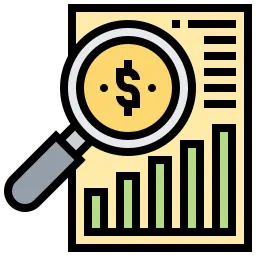
Looking to reduce your water bill?
The best place to start is by identifying some of the potential reasons why your water bill is so high in the first place.
These are 11 of the most common causes of unnecessarily high water bills.
Which ones are costing you?
1. Dripping Faucets
It’s crazy that you might be paying for water you’ll never use. But it’s surprisingly common. When many of us see a dripping faucet, we don’t get overly concerned about it, but we should.
It wastes so much water, which isn’t good for our planet. And it also wastes our money if we have water meters in our homes. Even a slow drip of only 10 drips every minute will lead to a loss of 350 gallons a year (3).
A fast leak can waste many times that amount.
2. Swimming Pools Overflowing
Some people love to have swimming pools in their backyards. They take a lot of water to fill, with a 12-foot by 24-foot pool with a 4-foot depth requiring 8,600 gallons.
If you fill your pool right to the top, you’re going to lose a lot of water as some of it will be splashed when people get in the pool. Filling it slightly lower will reduce water bills because you won’t be losing that water to splashing.
3. Leaking or Continually Running Toilets
Toilets use more than a quarter of the water your home goes through every day (4). With so much water cycling through those things, it’s easy to see how a leaky toilet would waste a lot of water and drive up your bill. A toilet leak can waste up to 300 gallons of water per day (5).
If you notice your toilet leaking, check your flush valve system. The flapper at the tank’s bottom should make a watertight seal. If it doesn’t, the water will begin to leak into the toilet bowl.
While a running toilet is an easy fix, it can be hard to tell if you have a leak because it’s silent. If your leak isn’t fixed after replacing the flush valve system, check for fill valve issues.
4. Lawn Care
If you have spent a lot of money on landscaping, you might want to water your yard to keep all those plants alive. But consider how much you need to water everything — you don’t need to overdo it.
Pay attention to when you’re watering your yard. It’s best to do it between 6 a.m. and 10 a.m. before the day gets too hot. You’ll have less evaporation that way.
If you’re not getting at least an inch a week of rain water, you can start watering. But if you’ve had rainfall and your yard still looks healthy, skip it if you can. It takes more than 62 gallons to give a 10-foot by 10-foot area of yard space an inch of water.
5. Water Heater Wait Time
You might be using more water than you have to, just waiting for your hot water to kick in. If it takes longer than you think it should to get your hot water running through your pipes, check there’s enough insulation around the pipes. A lack of proper insulation means you have to run more water as you wait.
While waiting for just a minute to warm up the water for a shower, you might use two gallons you’ll have to pay for.
6. Washing Cars at Home
You might have heard that it’s cheaper to wash cars at home rather than using a car wash. While you might part with a few dollars at the car wash, you could potentially pay more at home. If you leave the hose running while you wash and you have a meter, you’re going to pay for that water usage.
A commercial car wash may only use 30 gallons of water for each car washed there. If you run a hose the whole time you’re washing your car at home, at around the four-minute mark, you’ll use 30 gallons. Plus, you’ll have to pay for the cleaning supplies, while you won’t at a car wash.
It may be cheaper to leave it to the professionals. If you want to do it at home though, go old school and use a bucket and a sponge to cut costs.
7. Changes in Seasons
Be aware that you use more water in the summer, so you can be vigilant about ways to cut down. In the winter, you won’t usually be watering your garden. If you have a backyard pool, you won’t be filling it.
Summer tends to be a higher-usage time, partly because we do more with our yards and because it’s hotter. Remember to water your yard and plants during early morning hours to cut down on water usage.
Because you’ll often be spending more time indoors in the winter and you might be cold, keep an eye out for longer showers. If you want to warm up, try adding an extra blanket instead of taking a daily hot bath or long shower.
8. Socializing
Are you a social butterfly who tends to throw parties or have visitors come to stay overnight? That’s great for your mental health, but not so wonderful for your wallet.
Having guests over for parties can result in a lot more toilet flushes than you would typically have during an evening. Each toilet flush can use anywhere from 1.6 to 5 gallons, depending on how old the toilet is (6). Overnight guests take showers and may do laundry, which will drive up your water bill.
That doesn’t mean you can’t have guests, but if you’re struggling with your bill, it’s a good place to start. Maybe you can let your friends throw a party occasionally instead of always hosting.
9. Water Softener Constantly Running
If you use a water softener, how much water it will take to run will depend on the size and the make. But a continuously running softener will drive up your bill considerably. If you suspect your softener is running continuously, have it looked at.
10. Underground Pipe Leaks
Underground pipe leaks can waste gallons of water per minute if the leak is fast enough. But since it’s underground, how can you tell if you have a leak? Here are some ways:
- Areas of soil near your house that are soupy or extremely watery.
- Higher than normal water bills with no apparent cause.
- Water or moisture in your basement.
- Less water pressure than normal.
If you find a leak, you need to shore it up as soon as possible. It can cost a small fortune if it’s a severe one. A 1/4 inch leak can waste 15,226 gallons per day.
11. Broken Water Meter
If you see a huge water bill and you haven’t changed your usage, you might have a broken meter. To figure out if you have a broken meter, you can turn off your water and check your meter.
If it still shows usage, you should contact your water provider.
How to Reduce Your Water Bill
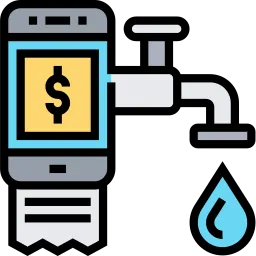
If you’re trying to trim the fat from your water bill, these 10 water conservation tips are exactly what you need.
They may seem like small measures, but when you implement a few at a time, they can add up quickly to significant savings.
How much you can save depends on a lot of factors, particularly how much your municipality charges for water. The city of Dallas, Texas, has an online water cost calculator you can play around with to see the impact saving water could make on the bank accounts of their residents (7).
In monthly water charges, if a family used 10,000 gallons in a month, the cost would be $31.44. If that family cut their consumption down to 5,000 gallons, they would only pay $11.44 for that portion of their bill.
A family who uses way more water, perhaps because of yard care or frequent entertaining, would pay much more. If they used 20,000 gallons a month, they would pay $96.44, just for their water usage. That doesn’t factor in other costs, such as heating that water.
Depending upon your current usage, you could easily knock $50 a month off your water bill and associated energy costs. That is an extra $600 a year, or $6,000 after 10 years, even if you stick that money in your mattress rather than drawing interest on it.
Your best bet at reducing your bill is implementing several of the following changes. If they seem overwhelming, you can add in one or two per week.
1. Reviewing and Comprehending Your Water Bill
As you try to make heads or tails out of your bill, you may be wondering what type of sadist made these so hard to understand. But once you get used to reading them, they aren’t so bad.
When looking them over, focus on these key areas (8):
- How you’re being charged.
- How much water you use per month.
- What your usage trend is — that can help you narrow down months of the year when you use more water.
2. Using Water-Saving Appliances
Water-saving appliances can save you money over the long haul. You’ll have an investment to make upfront. But if an appliance saves you $10 a month in water usage, it will pay for itself over time.
Some appliances you might want to consider include:
- EnergyStar certified water heaters.
- Tankless water heaters.
- Dual-flush toilets.
- Low-flow showers.
- Faucet aerators.
3. Fixing Plumbing Issues
If you have any water leaks or drips, get them under control. The simple ones you may be able to fix yourself.
For the more complicated ones, you may have to call someone in to do the work for you. Even if you have the temporary financial sting of having to call a plumber in, you’ll still save money in the long term from getting it fixed.
4. Don’t Build a Pool — Or At Least Cover Yours
If you haven’t already constructed your backyard pool, maybe hold off on that in favor of using the community pool. There are great aspects to using a local pool — including the chance to meet new people and save money and water.
But if you’re dead set on having a pool, at least make sure to cover yours to save on water loss from evaporation. If you don’t use a cover, about two inches a week will evaporate from your pool. Over a full year, that can mean an extra 10,000 to 20,000 gallons you’ll have to add (9).
5. Use a Car Wash Service
Unless you’re going to use a bucket and sponge, save it for your local car wash. It will save you time and money, especially if you’re the type who lets the hose run the entire time you are washing your vehicle. You might use more than 100 gallons to wash your car, while a car wash would use less than half of that (10).
Also, at a car wash, the water used to clean a car is either recycled for another wash or travels straight to a water treatment facility. At home, your water will either evaporate when it runs down your drive into the street, or it may end up in the sewer where the contaminants in the water might hurt our waterways.
6. Use Grey Water
Many of us may not be familiar with the term grey water. Simply put, it is all water that is used in households that doesn’t include toilet use. It’s the water used in your dishwasher, sinks, or showers. Some estimates say that one person can use as much as 1,350 gallons of grey water per person per month.
You can catch and use that grey water so it isn’t wasted. Do you turn on the faucet and wait a minute for the water to heat up before using it? Put a bucket in the sink and catch the water. You can use it to water plants or do your household cleaning with.
7. Insulate Pipes
That grey water we just talked about? You’ll produce less of it if you have properly insulated pipes. That will cut down on the amount of time you wait for your water to heat up before you wash your hands or take your shower.
Depending on whether you’re using the sink or the shower, your flow rate could be wasting two gallons of water during that minute.
8. Use a Hot Water Recirculation System
A hot water recirculating system will give you instant hot water at any faucet or shower when you need it. This will eliminate the water waste many of us have at the sink or shower when we’re waiting for water to heat up.
That can waste two or more gallons a minute. Add up that waste several times a day for handwashing or multiple household members showering, and it can easily amount to more than 20 gallons per day or more than 7,300 gallons per year.
9. Fix Your Water Meter
If you suspect a broken water meter, you’re likely paying for more water than you’re using. A high bill is a tough pill to swallow. But it’s even worse when you shouldn’t have to pay it in the first place.
A professional can tell you if there is a problem with your water meter. You may even be able to figure it out on your own.
10. Practice Water Conservation
One of the most effective ways to save water is by putting water conservation tips to use. Here are some of our favorites:
- Never run your dishwasher or washing machine without full loads.
- Take shorter showers and avoid baths altogether if you can. This can save you 100 gallons or more a day if you have multiple people in your household who take long showers.
- Turn your faucet off while brushing your teeth or lathering up your hands.
- If you have an older toilet, save money on every flush with a plastic bottle. It may save a family more than 10 gallons a day.
- Have you boiled some noodles for dinner? Let the water cool and use it to water your indoor or outdoor plants.
- Water your plants in the early morning hours. You’ll lose less to evaporation.
- Wash your dog outside. The water running off of your dog will also work to water your yard. Plus, you’ll have less dog hair clogging your drain.
- Wash your dishes in the dishwasher instead of buy hand. You might use twice as much water for handwashing.
- Use a broom to clean your driveways or sidewalks instead of a hose.
- Pull those weeds out of your garden. Fewer plants means less need for watering.
- Use mulch around trees and plants to cut down on evaporation of moisture.
- Install a faucet aerator to save hundreds of gallons per month (11).
Try These Leak Detection Tips

Sometimes you have to put on your detective hat when trying to locate leaks.
Here are some of the most useful tips for finding them.
Food Coloring Method
Suspect a toilet leak? Break out a box of food coloring for a cheap way to locate it.
To do this, put a few drops of food coloring in your toilet tank. Make sure you don’t flush it for at least 30 minutes or so. You’ll know you have a slow leak if, despite not hearing any water leaks, you see the food coloring has reached the toilet bowl.
Process of Elimination
If you think your water meter is broken or you have a hidden underground or in-wall leak, here’s what you can do.
Tell everyone to stop using any water in the house — no toilets, no sinks, showers, washing machine, or dishwasher. If your meter continues to show usage, you either have a faulty water meter or a leak.
Shut the water off in your house, concentrating on one appliance at a time. When you’ve turned an item off, watch for its impact on the water meter. If you see the meter stop moving after you’ve shut off water to that particular appliance, you’ve found your leak.
Look for the Most Common Leaks First
Some leaks are much likelier than others. A broken toilet flapper, for instance, is a common source of leaks. Check these other commons leaks first to save your time:
- Broken or worn seals on your appliances.
- Corroded pipes — you can suspect these if you see warped or discolored pipes.
- Bad pipes joints, which sometimes lead to banging sounds when you crank on the hot water.
Check Your Yard
Tree roots can cause damage to outside water lines that can cause a serious loss of water. The telltale sign of this will be a sinkhole or soggy ground when you haven’t had much rain. You might also have a decrease in your water pressure.
Give It the Jiggle Test
It doesn’t sound scientific at all, but it works. If you hear your toilet routinely leaking, jiggle the the flushing handle. Did that make it stop?
If so, you can fix that leak by tightening the nut that holds the handle to the toilet tank (12). That didn’t work? Then you might have to replace the handle with a new one.
Look for Discolorations
Under your kitchen or bathroom sinks, you might notice the bottom of the cabinet is discolored, warped, sagging, or constantly damp feeling. That’s a strong signal that you’ve had a past, present, or even continuous water leak.
How to Dispute Water Bills

It can be hard to fight water bills. Unless they’ve drastically gone up and you’re certain it’s a meter error, you’re probably stuck with the bill.
But it’s certainly worth a try because mistakes can happen and you may be able to talk your bill down if you’ve had a costly leak.
The first thing you’ll want to do is call the company or provider directly. That may mean a call to city hall or to the water company who serves the city. Be prepared when you call by having your current bill and a copy of the last couple of bills in hand.
You may also want to take notes — so have a pen and paper in front of you. Be polite, but firm, when talking to the employee. If you don’t get anywhere, ask to speak to a manager.
Make sure to ask if the bill was based on a meter estimate, which can occasionally happen, or if it was based on an actual reading. If fighting your bill directly doesn’t help, consider hiring an advocate to do it for you (13).
Be Sensible – Don’t Overpay

Water bills are a part of life, but you can reduce them easily if you use your imagination.
There are so many ways to save water that you can do it with just a little effort.
Remember, baby steps do add up. So even if something only saves a gallon a day, keep the bigger picture in mind. If you find a few other steps to reduce your water usage, it can add up to a nice chunk of change you’ll be saving each month.
And remember, you’ll also be saving on not needing to heat that extra water — it’s a double win
